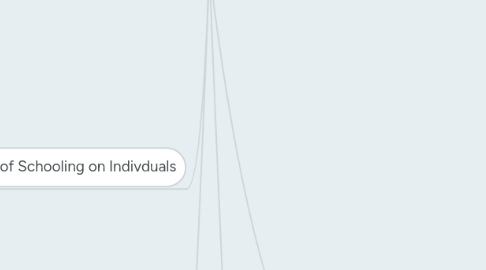
1. Effects of Schooling on Indivduals
1.1. Knowledge and Attitude
1.1.1. Programs and policies make a difference in students learning.
1.1.2. The higher the social class one the higher education level and grades will be.
1.1.3. Ron Edmonds the pioneer of the effective school movement
1.1.4. The more education a person recieves the more likely they are going to read books, magazines,and newspapers.
1.1.5. Highly-educated people are more into politics.
1.1.6. Education is part of a person well-being and self-esteem
1.2. Student and Peer Groups Alienation
1.2.1. Students attacks on teachers and students are increasing.
1.2.2. School violence has increased because teachers are underpaid.
1.2.3. There are four types of colleges students: careerists, intellectuals, strivers,and unconnected.
1.2.4. A student's culture plays a big part in shaping their educational background.
1.3. Gender
1.3.1. Men are paid more than woman for the same work.
1.3.2. Girls are socially and cognitively ahead of boys when the begin school.
1.3.3. In high school, girls' self-esteem is low.
1.3.4. Most teachers are women
1.3.5. Most principals are men.
1.4. Teacher Behavior
1.4.1. Teachers are models for students
1.4.2. Teachers influence students self-esteem
1.4.3. Teachers exceptions directly affect students achievement levels.
1.4.4. Students did better in their learning when their teachers gave them more praise.
1.4.5. Teachers have lower standards for minority and lower-income students.
1.4.6. Teachers are not responsible for everything that happens to their students.
1.5. Inadequate Schools
1.5.1. Urban schools did not provide educational opportunities minority and poor students
1.5.2. Suburban and private schools get a better education than others their age
2. Philosophy of Education
2.1. Existentalism
2.1.1. Generic notions
2.1.1.1. Existentialists believe that individuals are placed on this earth alone and must make sense out of it.
2.1.1.2. Sartre believed that people must create themselves and their own meaning.
2.1.1.3. This is done by the choices we make in our lives.
2.1.1.4. Indivdudals are in a state of constantly becoming, creating chaos and order.
2.1.2. Key Reseachers
2.1.2.1. Soren Kierkgaard
2.1.2.2. Martin Buber
2.1.2.3. Karl Jaspers
2.1.2.4. Jean Paul Sartre
2.1.2.5. Maxine Greene
2.1.2.6. Edmund Husserl
2.1.2.7. Maurice Meraleau-Ponty
2.1.3. Goal of Education
2.1.3.1. Existentalists believe that education should focus on the needs of indivduals; both cognitively and affectively
2.1.3.2. Stress individuality
2.1.4. Role of Education
2.1.4.1. Teachers must understand their own worlds to understand that of their students
2.1.4.2. Teachers must take risks
2.1.4.3. Teachers must work constantly in order for their students to be awakened.
2.1.4.4. Introspection is useful in order for students to become in touch with their worlds.
2.1.5. Method of Instruction
2.1.5.1. Learning is personal
2.1.5.2. Teachers believe that each student has a different learning style and is up to the teacher to find out their learning styles
2.1.5.3. Teachers are constantly rediscovering and students are discovering knowledge. They work together to understand the past, present, and future.
2.1.5.4. Help students understand the world through questions.
2.1.6. Curriculum
2.1.6.1. Huamnities
2.1.6.2. Literature has special meaning because it moves readers to levels of awareness.
2.1.6.3. Art, drama, and music encourage personal interaction.
2.1.6.4. Exposing students to problems and possibilities at early ages, and horrors as well as accomplishments.
3. Purposes of Education
3.1. 1.Intellectual
3.1.1. teach cognitive skills, transmit knowledge, and help students acquire higher-order thinking skills.
3.2. 2. Political
3.2.1. inculcate allegiance to the existing, to prepare citizens to participate, to help diverse cultural groups into a common political order, and teach children common laws
3.3. 3. Social
3.3.1. help solve social problems, to work as one group to maintain such order, and socialize our children into various categories of society
3.4. Economic
3.4.1. Prepare students for occupational roles in the future
4. Politics of Education
4.1. Liberal Perspective
4.1.1. Role of the school
4.1.1.1. Provides equal opportunities for all students to succeed in the world.
4.1.2. Explainations for unequal Performances
4.1.2.1. Belief that some children start school off with better chances than their peers. We as a society, must provide opportunities for those less fortune students to receive the same chances as their classmates.
4.1.3. Definition of educational problems
4.1.3.1. Limit the chances for poor and unprivileged children and underachievement is very serious issue with this group.
4.1.3.2. Too much focus is placed on maintaining discipline.
4.1.3.3. Inequality in all ascepts
4.1.3.4. The curriculum leaves out diversity in cultural groups.
5. History of Education
5.1. Reform Movement
5.1.1. Opposition to Public Education
5.1.1.1. Horace Mann have the idea that public schools should exist. Many people felt that taxing public schools was unfair.
5.1.1.2. The Roman Catholics founded their own schools because they believe that the public schools were dominated by the Protestants
5.1.1.3. In the 1860s public schools were being established all over the world.
5.1.1.4. 1862 Congress passed the Morrill Act which granted money to allow for public schooling.
5.2. Historical Interpretation of U.S. Education
5.2.1. The Democratic-Liberal School
5.2.1.1. Provides equal rights for all students.
5.2.1.2. Each part education invovle the views of liberal reformers to broaden the educational rights of all.
5.2.1.3. Popularization and multitudinousness
5.2.1.4. students from different cultural backgrounds recieve the same educational rights as others.
5.2.1.5. Social goals were just as important as educational goals.
5.2.1.6. Lawrence A. Cremin was the biggest supporter of Democratic-Liberal Schools.
6. Sociology of Education
6.1. Theoretical Perspectives
6.1.1. Functionalissm
6.1.1.1. Interdependence
6.1.1.2. Society as thought of as a machine
6.1.1.3. Emile Durkheim was the first sociologist to use this point of view
6.1.1.4. Consensus is normal process and conflict just represents a breakdown of values.
6.1.1.5. Schools categorized students are according to their ability level.
6.1.2. Conflict Theory
6.1.2.1. They do not view society as straightfoward
6.1.2.2. Emphasis is placed on struggle
6.1.2.3. Schools are often referred to as battlefields. Everybody is against each other.
6.1.3. Interactionalism
6.1.3.1. Internationalists look at the big picture
